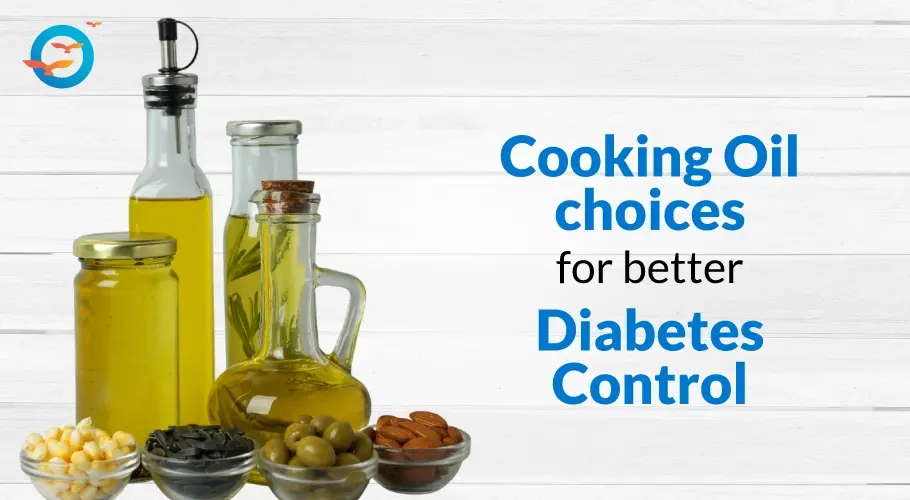Best cooking oils for Diabetes

Managing diabetes involves making careful choices, including what cooking oil to use. The type of cooking oil can impact blood sugar levels and overall health. Here, we explore some of the best cooking oils for diabetes and how they can benefit those with this condition.
Understanding Diabetes and Diet
Diabetes is a metabolic disorder characterized by high blood sugar levels. While genetics and lifestyle factors play a role, diet is a key component in managing the condition.
For people with diabetes, it's essential to choose foods that help maintain stable blood sugar levels.
The Role of Cooking Oil
Cooking oil is a staple in most kitchens, used for frying, sautéing, and dressing salads. However, not all cooking oils are created equal, especially for those with diabetes. The type of fat in the oil and its impact on blood sugar levels are crucial considerations.
There are several types of oils classified based on their source and method of extraction. Here are some common ones:
Classification of oils based on method of extraction:
1. Cold-Pressed Oils:
These are extracted from seeds, nuts, or fruits using a mechanical press without the use of heat or chemicals, retaining their natural flavor, aroma, and nutritional value. This process ensures that the oil retains its beneficial properties, such as antioxidants, vitamins, and essential fatty acids, which can be lost in oils extracted using high heat or chemical methods.
Cold-pressed oils are known for their rich flavor and health benefits. They are believed to help in lowering cholesterol, improving heart health, aiding in weight loss, and promoting better skin and hair health. Due to their high nutritional value and purity, cold-pressed oils are increasingly preferred by health-conscious individuals and those seeking natural, unprocessed foods.
2. Extra Virgin Oils:
Extra virgin oils are typically cold-pressed oils that are of the highest quality and purity. They are the very first extractions coming out of the source hence richer in antioxidants.
They are not refined or processed, retaining the most flavor and nutrients. Examples include extra virgin olive oil and extra virgin coconut oil.
3. Refined Oils:
Refined oils, undergo a process that involves high heat and the use of chemicals to extract the oil from seeds or nuts.
This process helps remove impurities and extends the shelf life of the oil but may also strip away some of its natural flavour and nutrients.
4.Filtered oils:
Filtered oils, as the name suggests, are the oils which are physically filtered through strainers and filtering agents to remove large particles and impurities present in the oils.
They are darker in colour as compared to the refined oils and carry peculiar odour. They are better choices over refined oils as they retain good amount of antioxidants and fat soluble nutrients. They are cheaper as compared to the cold pressed varieties.
5. Hydrogenated Oils:
These oils are processed to become solid at room temperature through hydrogenation. This process creates trans fats, which are considered unhealthy. Examples include partially hydrogenated vegetable oils used in some margarines and processed foods.These oils are better to be completely omitted from a diabetics diet. They are commonly present in processed foods.
Understanding the source and extraction method of oils can help consumers make informed choices based on their health and culinary preferences.
Refined oils Vs cold-pressed
On the other hand, cold-pressed oils, like cold-pressed olive oil or cold-pressed coconut oil, are extracted without the use of heat or chemicals, preserving more of their natural taste and nutritional value.
Cold-pressed oils are often considered healthier options due to their minimal processing and higher nutrient content, although they may be more expensive than refined oils.
How to choose right cooking oil?
When selecting the ideal cooking oil, it's essential to consider genetic factors and regional preferences. In South India, coconut oil and sesame oil are popular choices due to their abundance and health benefits. Coconut oil is known for its high smoke point and distinct flavor, making it suitable for various dishes. Sesame oil, on the other hand, is valued for its nutty taste and rich aroma.
In West India, groundnut oil is preferred for its mild flavor and ability to withstand high temperatures, ideal for deep-frying and cooking. Mustard oil is a staple in East and North India, appreciated for its pungent flavor and potential health benefits.
Understanding these regional preferences can help you choose the right oil to enhance the flavor and authenticity of your dishes. The oils which are commonly used in India are groundnut, sunflower oil, safflower oil, mustard oil and rice bran oil.
Best Cooking Oils for Diabetes
1. Olive Oil:
Olive oil is rich in monounsaturated fats, which can improve blood sugar control and insulin sensitivity. It also contains antioxidants that reduce inflammation and the risk of heart disease, a common complication of diabetes. Preferred use in salad dressings instead of heating them.
2. Coconut Oil:
While high in saturated fats, coconut oil has medium-chain triglycerides (MCTs) that are metabolized differently and may improve insulin sensitivity. However, it should be used in moderation due to its high calorie content.
3. Avocado Oil:
Avocado oil is another source of monounsaturated fats and antioxidants. It may improve insulin sensitivity and reduce inflammation, benefiting those with diabetes. This oil can't be used for cooking. It is largely used in salad dressings.
4. Canola Oil:
Canola oil is low in saturated fats and high in monounsaturated fats. It also contains omega-3 fatty acids, which have anti-inflammatory properties and may improve heart health in people with diabetes.
5. Flaxseed Oil:
Flaxseed oil is rich in alpha-linolenic acid (ALA), an omega-3 fatty acid that may improve insulin sensitivity and reduce inflammation. However, it should not be used for cooking and is best used in dressings or added to foods after cooking.
Important Note
Use of flaxseeds oil, olive oil, avocado oil should be avoided for heat cooking in India as they are heat sensitive.
It's beneficial to practice oil cycling, which involves using a variety of oils to ensure the intake of all essential fatty acids.
Conclusion
Choosing the right cooking oil is an important part of managing diabetes. Opting for oils rich in monounsaturated fats and omega-3 fatty acids can help improve insulin sensitivity, reduce inflammation, and lower the risk of heart disease. It's also crucial to use oils in moderation and to complement them with a balanced diet and regular exercise to effectively manage diabetes.
For diabetics, it's important to consider their overall calorie intake and understand the cooking methods used, such as avoiding deep-fried foods. This awareness helps in determining the appropriate amount of oil to consume.
FAQs
Which oil is best for cooking in diabetes?
1. Olive Oil
2. Coconut Oil
3. Avocado Oil
4. Canola Oil
5. Flaxseed Oil
Is olive oil safe for diabetics?
Yes, olive oil is rich in monounsaturated fats, which can help regulate blood sugar levels and improve heart health.
Can diabetics use coconut oil for cooking?
Coconut oil can be used in moderation, but it's high in saturated fats, so it’s best to consult a doctor or dietitian for personalized advice.

